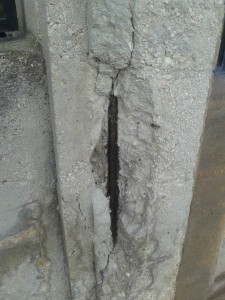 In recent decades, with the objective of reaching a more sustainable development, worldwide society has increased its concern about environmental protection. Nevertheless, there are still economic sectors, such as the construction industry, which produce significant environmental impacts. Life Cycle Assessment (LCA) is a tool that enables identifying environmental issues related to both finished products and services, and allows focusing efforts to resolve them. The main objective of this paper is to asses LCA applicability on concrete structures so that construction’s environmental performance can be improved. For this purpose, an attempt is made to provide a decision-making tool for construction-sector stakeholders with reliable and accurate environmental data. The research methodologies used in this paper are based on a literature review and are applied to a case study. This review was performed to collect information on LCA methodologies currently in use and their practical application. The case study subsequently described in this paper involved identification of the most sustainable type of slab for a reinforced concrete structure in a residential building, using two different databases. It was observed that, depending on the database selected and inherent assumptions, results varied. Therefore it was concluded that in order to avoid producing incorrect results when applying LCA, it is highly recommended to develop a more constrained methodology and grant access to reliable construction-sector data. (link)
In recent decades, with the objective of reaching a more sustainable development, worldwide society has increased its concern about environmental protection. Nevertheless, there are still economic sectors, such as the construction industry, which produce significant environmental impacts. Life Cycle Assessment (LCA) is a tool that enables identifying environmental issues related to both finished products and services, and allows focusing efforts to resolve them. The main objective of this paper is to asses LCA applicability on concrete structures so that construction’s environmental performance can be improved. For this purpose, an attempt is made to provide a decision-making tool for construction-sector stakeholders with reliable and accurate environmental data. The research methodologies used in this paper are based on a literature review and are applied to a case study. This review was performed to collect information on LCA methodologies currently in use and their practical application. The case study subsequently described in this paper involved identification of the most sustainable type of slab for a reinforced concrete structure in a residential building, using two different databases. It was observed that, depending on the database selected and inherent assumptions, results varied. Therefore it was concluded that in order to avoid producing incorrect results when applying LCA, it is highly recommended to develop a more constrained methodology and grant access to reliable construction-sector data. (link)
